- Home
- S. J. Parris
A Christmas Requiem
A Christmas Requiem Read online
A CHRISTMAS REQUIEM
S. J. Parris
Copyright
HarperCollinsPublishers Ltd
1 London Bridge Street
London SE1 9GF
www.harpercollins.co.uk
First published in Great Britain by HarperCollinsPublishers 2020
Copyright © Stephanie Merritt 2020
Cover design by Holly Macdonald © HarperCollinsPublishers Ltd 2020
Cover images © Alamy and Shutterstock
Stephanie Merritt asserts the moral right to be identified as the author of this work
A catalogue record for this book is available from the British Library
This novel is entirely a work of fiction. The names, characters and incidents portrayed in it are the work of the author’s imagination. Any resemblance to actual persons, living or dead, events or localities is entirely coincidental.
All rights reserved under International and Pan-American Copyright Conventions. By payment of the required fees, you have been granted the non-exclusive, non-transferable right to access and read the text of this e-book on-screen. No part of this text may be reproduced, transmitted, down-loaded, decompiled, reverse engineered, or stored in or introduced into any information storage and retrieval system, in any form or by any means, whether electronic or mechanical, now known or hereinafter invented, without the express written permission of HarperCollins e-books
Source ISBN: 9780008411817
Ebook Edition © November 2020 ISBN: 9780008455071
Version: 2020-09-16
Contents
Cover
Title Page
Copyright
Naples, December 1569
Keep Reading …
About the Author
Also by S. J. Parris
About the Publisher
Naples, December 1569
When they told me the Pope wanted to see me, my first thought was that it must be a joke. My second was that it must be a trap.
‘For God’s sake, Giordano Bruno.’ The prior paced the good Turkey carpet in his study, hands clasped behind his back, black-and-white robes whisking about his legs so that he resembled a giant magpie. I knew then that the matter was serious; only extreme frustration could provoke the prior to take the name of Our Lord in vain. It happened a lot when he dealt with me. ‘Can you not comprehend what an honour this is for our convent? That His Holiness should condescend to show interest in a friar from San Domenico Maggiore – and you only twenty-one years old, and from a family of no distinction? It’s a mark of God’s favour, and your reluctance is nothing short of disobedience.’
He stopped and fixed me with his corvine glare. I avoided his eye and looked instead at the hard December sky over Naples through the windows behind him.
‘Call it prudence, Most Reverend Prior,’ I said. ‘I can’t help wondering how His Holiness knows of me, and what he might have heard to prompt his interest.’
‘Oh, there is no mystery there,’ he said, resuming his steady steps. ‘Fra Agostino da Montalcino has the ear of one of the cardinals. It would seem you made a great impression on Fra Agostino during his recent visit to Naples, and he has been mentioning your name all over Rome. Word reached the Holy Father, and now here is your official invitation. I’m surprised you are not more animated by the prospect – I had thought you an ambitious young man.’ He arched one thin eyebrow as if challenging me to deny the charge.
‘Fra Agostino hates me,’ I said bluntly. ‘If my reputation in Rome is built on his reports, I’ll be walking straight into the arms of the Inquisition. And everyone knows Pope Pius V is …’ I let the sentence fall; even I had the sense not to insult the Pope to the prior of the most prestigious convent in Naples.
‘Zealous in his pursuit of purity,’ the prior finished for me. ‘Yes. Before he ascended the throne of St Peter, he was Grand Inquisitor. They say he still wears a hair shirt under his robes.’ The way he pursed his lips suggested that he considered such practices primitive, though he would never say as much. ‘And Fra Agostino did not hate you. He found you irritating, I grant, but he is hardly alone in that. It is entirely possible for someone to recognise and admire your intellectual gifts, Fra Giordano, even while finding you most infuriating in person.’
I sensed we were no longer talking about Fra Agostino, so I changed the subject.
‘I had hoped to visit my family for the Octave of Christmas.’
He made an exasperated noise and crossed to his desk, where he picked up and brandished the letter I had not been allowed to read.
‘This is not a suggestion, Fra Giordano.’ He flicked it with one finger. ‘It’s a summons. Pope Pius wants you to demonstrate your memory system. You are expected at the Vatican in time for the Christmas Masses. That is the end of the discussion. Your family will still be there next year in whatever godforsaken village you crawled out of when you joined the Dominican order.’
‘Nola,’ I muttered, drawing myself up. The prior, like all the senior brothers at San Domenico, was the younger son of a baron, raised in a palazzo until he exchanged the rich silks and servants of a nobleman for the rich silks and servants of a wealthy churchman. My hometown on the other side of Mount Vesuvius may have been small and rural, but it riled me to hear it insulted by a man who would never set foot there. ‘Makes the best olive oil in the kingdom.’
He almost smiled. ‘I never heard of a village that didn’t claim that distinction. But you have left that life behind. Tell me – do you not wish to see the glories of Rome, make an impression on the most powerful men in Christendom?’
I dipped my head in acknowledgement. ‘If I could be sure they were not going to burn me.’
The prior rolled his eyes. ‘I would not send you if I thought that were likely,’ he said, smoothing the folded letter to a crisp edge between his fingertips. ‘Apart from anything else, it would reflect very badly on me. Just try not to do anything stupid.’
I ran straight across the cloister to the infirmary in search of the wisest man in San Domenico. Fra Gennaro Ferrante was bent as usual over the workbench in his dispensary, mashing herbs to make a purgative for one of the elderly brothers whose kidneys were failing. At the sight of my face, he dismissed the young novice who was assisting him, as I once had, and wiped his hands on his apron.
‘But Fra Agostino hates you,’ he said, when I told him my news. ‘You made him look a fool in front of the entire convent by contradicting him in public.’
I leaned back against the bench. ‘He made himself look a fool with his idiotic arguments. I merely pointed that out, in case anyone had failed to notice.’
‘Yes, and you had a church full of friars laughing at his expense. The head of the Dominican convent in Rome, Bruno, twenty years your senior, honouring us with an official visit, and some young upstart makes him a laughing stock in the middle of his sombre address?’ He shook his head. ‘If you did that to me, I would not respond by recommending you for preferment to the Pope.’
‘Perhaps Fra Agostino is a man of greater Christian charity than you, despite his stupidity.’
‘I doubt it. I saw his face when he stormed out.’
‘Then you agree that it must be a trap? I shouldn’t go?’
He lifted a shoulder. ‘I don’t see that you have a choice. You can’t turn down the Holy Father. But you should not go alone. If you think religious politics in Naples is a nest of vipers, wait till you walk into the Vatican.’
‘You’ll come with me?’ I grasped at his sleeve, delighted; the prospect took on a different hue if Gennaro would be my companion. I had been to Rome only once, as a boy, and had hardly allowed myself to admit how much I wanted to see the Eternal City again, with its ancient ruins and new wonders of art an
d architecture. The prior was right; I was ambitious. But my ambitions did not tend in the right direction for a career in the Church. In Italy, it was acceptable to lust after wealth and power, even under such an austere pope as Pius V. What was not condoned was a desire for knowledge, for exploring beyond the limits of what the Church permitted us to know about the heavens, the earth, the human body, and my refusal to accept that the old ideas were true simply because it had always been so had already brought me the unwelcome attentions of the Inquisition.
Gennaro laughed, and gestured to the tools of his trade lying on the workbench.
‘The prior would never allow me to go – I am needed here. But leave it with me. You will need powerful friends in Rome, if you have powerful enemies. I have an idea.’
Two days later, the prior called me back to see him. He seemed less agitated this time; instead of pacing, he stood by the tall arched window in his office, looking out over the rooftops of the city towards the bay, while I hovered by the empty fireplace, uncertain as to whether I should sit without an invitation.
‘Do you know of Giambattista della Porta?’ he asked, turning swiftly to watch my reaction.
I composed my face into what I hoped was a blank.
‘I have heard the name,’ I said carefully. Was this a trap? But if the prior had any reason to confront me about my association with della Porta, he could have done so long before now, I told myself. I clasped my hands together inside my sleeves to hide any tell-tale trembling.
‘Hm. Yes, he has a certain … reputation in Naples,’ the prior said, his lips tight. ‘But he is also a most generous benefactor to this convent.’
‘I – had no idea,’ I said. This, at least, was the truth.
‘Don Giambattista della Porta donates lavishly to San Domenico because we are the city’s Inquisitors, and for someone like him, it makes sense to keep the Inquisition on his side. Not that we can be bought, of course,’ he added quickly. ‘You know what is said of him, I presume?’
His eyes fixed on mine; I gripped my hands tighter and fought not to swerve from that searching gaze.
‘I understand he is a patron of learning and a great collector of books.’
The prior grunted a reluctant acknowledgement. ‘Many of those books forbidden by the Holy Office. He has published writings on natural magic and cryptography which brush too close to occult knowledge, in my view. But he has the patronage of Cardinal Luigi d’Este, so who am I to argue?’
I said nothing, wondering where the conversation was tending. If the prior knew or suspected that I belonged to the Academy of Secrets, Porta’s underground society for the advancement of scientific knowledge and the sharing of banned books, he would surely have produced some evidence by now. Even so, I felt a trickle of sweat run down my neck, despite the chill of the room. Merely the rumour of such a society’s existence could be enough to warrant interrogation by the Father Inquisitor, and we all knew what that involved.
‘Della Porta writes to tell me he has heard of your invitation from His Holiness, and since he plans a Christmas visit to Rome to see his patron, he offers to take you in his coach.’ He pressed his hands together as if in prayer and touched his forefingers to his lips. ‘This would be extremely convenient for me, as it would save us the expense of your journey, and the trouble of sending servants to accompany you. On the other hand, I am not persuaded that della Porta is at all a suitable acquaintance for a young friar so prone to questioning authority as you, Fra Giordano. Two days of travelling with him and God knows what heretical notions he might fill your head with.’
I lowered my eyes and strove to contain my excitement. ‘Most Reverend Prior, you said yourself that this invitation from His Holiness is a sign of God’s favour. Perhaps, like Our Lord, I must face temptation along the way. If you pray for me, I am certain that my faith will remain strong enough to resist.’
He blinked. ‘Are you comparing yourself to Christ, Bruno?’
‘No. I – that is …’ I could not tell if he was mocking me. ‘Besides, heretical ideas are to be found everywhere.’
‘That much is true. And you have distinguished yourself from your earliest novitiate as one with an appetite to seek them out. I shall pray on the matter.’ He turned back to the window. ‘Della Porta says he will introduce you to the cardinal. Este would be a useful man to know, I must say. His family is one of the most influential in Italy, and he is celebrated for his generosity. If you impress him, it would reflect well on San Domenico.’ Though he had his back to me, I could almost hear the clicking of the abacus in his head as he calculated the possible value of these contacts against the potential dangers.
‘Then surely it is to the glory of our convent that I make this journey in such company, Most Reverend Prior?’ I asked, all innocence.
He shot me a knowing look over his shoulder and folded his arms. ‘See – I said you were ambitious,’ he murmured, with that not-quite smile.
So it was that on the twenty-third of December 1569 I found myself rattling along the Via Appia northwards, wrapped in a wool cloak against the December chill, marvelling at receding vistas of hills ridged with lines of cypress trees and fortress towns. Occasionally I stole a glance at the sharp profile of my companion, who kept his head bent over a book for the most part; he was a seasoned traveller, for whom the journey held few novelties. I had known Giambattista della Porta a little over a year, and was still in awe of him, in the way that a young man looks up to an older one who seems to embody all the virtues and accomplishments he himself aspires to. Porta was the second son of a wealthy nobleman; at only twenty-three, he had published a four-volume encyclopaedia of natural magic, which had been reprinted five times in Latin and translated into Italian, French and Dutch. Now, in his mid-thirties, he was cultivating an international reputation for his poetry and plays, and his treatises on optics, cryptography and the art of memory. His book collection was the envy of universities and religious houses across Naples, but only a select few of his most trusted confidants knew of his secret library and its treasure of occult learning, hidden in a specially constructed inner room lest the Inquisition take too close an interest in his business.
‘First time outside the Kingdom of Naples?’ he asked, turning to me with an indulgent smile, taking my frequent gasps for expressions of amazement, when more often they were reactions to the lurching of the carriage. For all its obvious expense, it was spectacularly uncomfortable, its bone-shaking jolts made worse by the state of the roads.
‘My father brought me to Rome once as a boy, though I don’t remember much. You visit often, I suppose?’
‘I used to. Though I haven’t been for three years – not since Pope Pius was elected. I wonder if they are any closer to finishing the great basilica of San Pietro. I doubt it. Since Michelangelo Buonarroti died there is no one worthy to take over the work. It will be a miracle if the dome is on before the Second Coming.’ He leaned back in his seat and crossed one leg over another. ‘Rome is a remarkable city for studying the art of geometry in architecture. The Florentines think they invented the rebirth of the classical style, but their inspiration came from the imperial ruins in Rome, and Rome perfected it. Oh, and you must see Buonarroti’s frescoes in the Sistine Chapel before you leave. An artist whose genius will not be seen again in Italy. Not under this pope, anyway – a man with no vision except to castigate everything that brings pleasure or enlightenment.’ His lip curled. ‘You know that Pope Pius was a goatherd until he joined the Dominican order at fourteen? No wonder he has so little refinement or feeling for beauty.’
‘I was also running about the hillsides until I joined the Dominicans,’ I said, somewhat defensive. ‘Growing up in the country does not in itself confer narrowness of mind. That’s a flaw that afflicts people of all stations.’
‘True.’ He bowed his head by way of apology. ‘I have known plenty of men raised in grand palazzi among all the advantages of art and learning, with less wit to appreciate them than that horse.’ He
gestured out of the window, where his bodyguard, Tito, rode alongside the carriage, with three other armed men under his command. ‘And Pope Pius has had fifty years of immersion in all the scholarship of the Dominicans, and still he thinks only of purging heresy – and by heresy, he means anything he can’t understand. Watch your step with him.’ His face grew serious, and his golden eyes darkened. ‘When he was head of the Inquisition in Como, he had to be recalled for being too enthusiastic in his persecution of miscreants. He’s executed bishops before now. He will know exactly how to trip you up, if he has a mind to it.’
‘I heard he made the Jews in Rome wear badges to mark them out,’ I said.
He grimaced. ‘And he has sodomites burned alive in the public piazzas. Often on no more than hearsay.’ He fell silent and turned back to the window. I knew it was whispered of him, a man of his age with no wife or children, though I had never dared ask if there was truth in the rumours. I wondered if that was what had kept him away from Rome for so long.
‘Still,’ he continued, ‘from what I hear, Pius is too busy worrying about Elizabeth Tudor to spare much thought for your misdemeanours.’
‘Who?’
He laughed. ‘The queen of England, Bruno. You must know that her father broke from Rome and declared himself head of his own Church, and Elizabeth – who is considered a bastard by the Catholics – persists in his heresy. I heard the Pope is considering a bull to excommunicate her, which would as good as give her Catholic subjects licence to regicide.’
I did not see the relevance. I could barely have pointed to England on a map; in my limited knowledge, it was a miserable, bitterly divided country of never-ending rain, constantly burning its subjects every time it switched religion, and whether its sovereign was excommunicated was of little interest to me. It was not as if I had any intention of going there.
A sickly smell of decay began to seep through the gaps in the carriage windows. We had experienced this before along the Via Appia, but now the smell had intensified. Porta took out a scented kerchief and pressed it to his nose and mouth; then, seeing I had none, offered it to me.

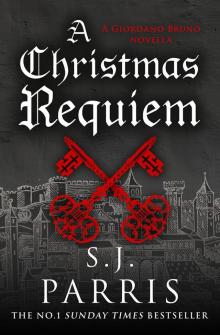 A Christmas Requiem
A Christmas Requiem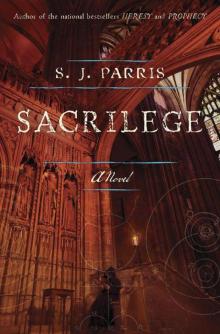 Giordano Bruno 03 - Sacrilege
Giordano Bruno 03 - Sacrilege The Dead of Winter: Three gripping Tudor historical crime thriller novellas from a No. 1 Sunday Times bestselling fiction author
The Dead of Winter: Three gripping Tudor historical crime thriller novellas from a No. 1 Sunday Times bestselling fiction author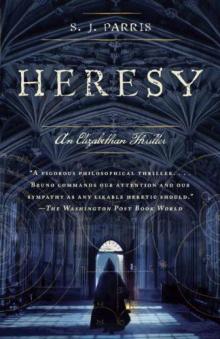 Giordano Bruno 01 - Heresy
Giordano Bruno 01 - Heresy The Dead of Winter
The Dead of Winter Treachery (2019 Edition)
Treachery (2019 Edition) The Academy of Secrets
The Academy of Secrets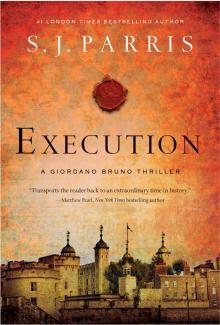 Execution
Execution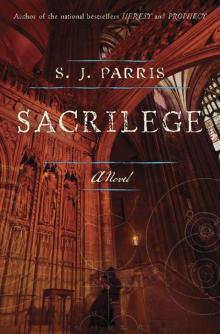 Sacrilege: A Novel
Sacrilege: A Novel Prophecy
Prophecy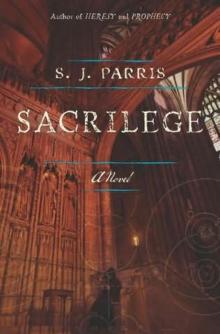 Sacrilege gb-3
Sacrilege gb-3 Prophecy (2011)
Prophecy (2011) Treachery
Treachery Prophecy gb-2
Prophecy gb-2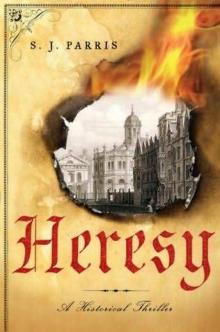 Heresy
Heresy